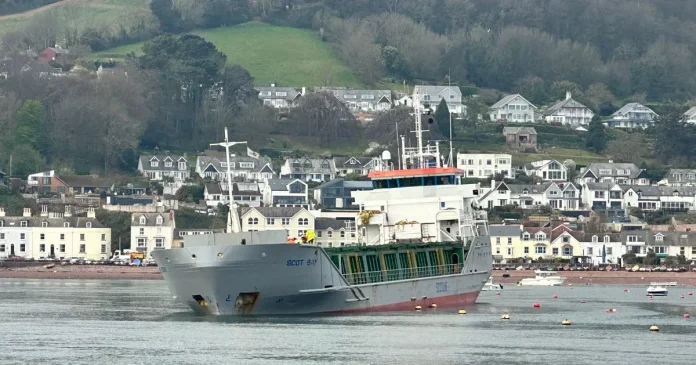A large cargo ship has run aground in a harbour in Devon and all other vessels have been warned to remain clear while workers attempt to move it.
The ship had sailed in from IJmuiden – a port city near Amsterdam – before getting stuck on Teignmouth Harbour just before 6am this morning. Harbour master Rob Parsons said the eight crew members on board suffered no injuries and that the boat, which was carrying animal feed, was secure. It is due to be moved in this evening’s tide with all other vessels warned to remain clear. Workers are now focusing on getting the ship alongside the quay to load off its cargo, Mr Parsons said. He added: “One thing I’m always worried about is people are keen to watch things like this. That’s great and we can’t stop that from shore. But what we don’t need is people that are on the water who are going to cause issues.”
The harbour master said he was confident the issue would be resolved on Thursday evening with the help of good weather and tides building in the area. The boat had been anchored for a few days before it tried to sail into the harbour, and was around 100m (328ft) from the quay where tugs were called in from other areas to help with the move, Mr Parsons said.
The Marine Accident Investigation Branch said it was aware of the incident and “making initial inquiries”. The Teignmouth Harbour Commission (THC) said in a post at 7.14am that the team would try to coordinate a plan to get the cargo vessel to where it needs to be.
The THC’s message, signed of by Rob, likely Rob Parsons, said: “Please note that I am aware of the situation within the river regarding the cargo vessel. Myself and my team are on site and I will be coordinating with our partners to rectify and get the vessel to where it needs to be safely. I will of course update as and when I can.”
A ship that runs aground can be at risk of structural damage – which can lead to leaks, hull breaches, and even sinking. Beyond the immediate threat to the vessel, there’s also a risk of cargo spills and hazardous chemical leaks, posing environmental and safety hazards. Groundings can also damage the surrounding environment.
At Reach and across our entities we and our partners use information collected through cookies and other identifiers from your device to improve experience on our site, analyse how it is used and to show personalised advertising. You can opt out of the sale or sharing of your data, at any time clicking the “Do Not Sell or Share my Data” button at the bottom of the webpage. Please note that your preferences are browser specific. Use of our website and any of our services represents your acceptance of the use of cookies and consent to the practices described in our Privacy Notice and Cookie Notice.


